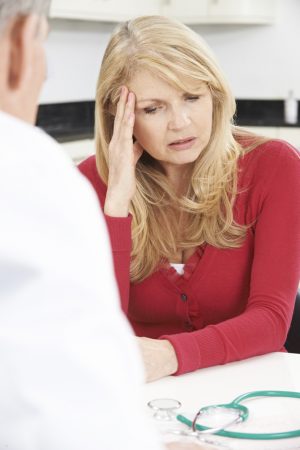When you’re told you have cancer, in a split second everything comes to a grinding halt. You’re so dumbfounded, you can’t think straight.
I remember the moment a radiologist pointed out all the tiny white specks on my mammogram three years ago. Calcifications, he said. Some looked normal and some he wasn’t sure about. A biopsy came back positive for DCIS, ductal carcinoma in situ. Stage O breast cancer.
To this day, I’m not sure if it was really cancer or not. It’s a controversial topic. After extensive research and conversations with more than one doctor, I decided to have a lumpectomy and nothing else. Other women have made different choices.
I think the most important thing to do when you get a diagnosis of cancer is to ask lots of question. If you’re not sure what to ask, Deb Nelson wrote a helpful book called Heal Your Cancer: 12 Bold Questions to Ask on Your Journey to Health.
I also asked Dr. Tracey Weisberg, a breast cancer specialist at New England Cancer Specialists, about the most common questions she gets from her patients. She shared three. Here are the questions and her answers.
How did I get this cancer?
Sadly, in spite of all the advancements in molecular biology, we still do not have a clear understanding of why people get cancer. If we did have a clear understanding, we would obviously all work toward making changes in our lives that would protect us from this condition.
We do broadly, however, understand that there is an event or events that can allow one of our cells to become immortal and thus lack the capacity to die. These cells can take hold in the body and cause a cancerous growth if other factors within us prevent this cell from being effectively removed by our immune system.
Some individuals may be predisposed to getting cancer because they have mutations, or faulty pieces of genetic information, that are passed to them from previous generations. Scientists, however, believe that this solely accounts for only 10-15% of cancer causation.
Cancer definitely is a disease of aging. We are fortunate to live in the Western world where the population does not succumb to infections, war, and starvation at early ages. The downside to this modernization is that our bodies grow old and part of growing old is making more cancer cells that can take hold and ultimately be the cause of death in an elderly individual. It is well known that if all lived into their late 90s and 100s, at autopsy, small cancers would be detected throughout the body (mostly in breast and prostate) that may or may not have had a role in the individual’s death.
Our living environment contributes to cancer. Within our environment, there are toxins that may affect our body and lead to a more rapid development of immortalized cells. Cigarette smoking is an excellent example of one such toxin that clearly can lead to an acceleration of cancerous cell development in the lung. Individuals who live near factories may be exposed to contamination either in the air or adjacent waters that can over time cause a cancer to develop.
As far as breast cancer is concerned, exposure to certain hormones like estrogen in some woman may be such a toxin. It is thought that if a woman starts her period at a very young age, does not interrupt her menstrual cycles with pregnancy, or has many pregnancies, these “abnormal” hormone exposures may indeed be toxic events and lead to the development of breast cancer cells.
Our diets may indeed be becoming “toxic” and lead to all sorts of human illnesses. As we move more to fast food and higher carbohydrate diets, we lose the nutrient dense diet that the human species was originally designed to consume. Our fast-paced lives and our efforts to feed our population at low cost have led to diets that result in a higher glycemic index.
Our diets for many individuals can lead to obesity, high blood pressure, diabetes, metabolic syndrome, and heart conditions. Our physiology is thus stressed and also likely our immune system. This stress on the immune system, through inadequate nutrition, may be a causative factor in the development of cancer.
Our lifestyles also may have a role in cancer development.
- Movement is important to overall health, fitness, and muscle tone and bone strength. We live in a world where many of us spend the day sitting with little or no movement. When we do move, we go to the gym or run and massively stress the body for brief periods of time.
- Many of us have interrupted sleep due to stressful lifestyles, our sleep environment, our poor digestion, or perhaps even working at night. Some scientists think that this produces stress and abnormal cortisol levels which may affect the overall health of the immune system.
- Emotional stress is rampant in our culture. We live in a world of high expectations and need for immediate resolution of problems. Our news usually reflects on the sadness and misfortune of the world and sub-consciously stresses us.
- Our sexual choices or the previous choices that our partners may have made in the past, in some cases have resulted in certain viruses living within us in semi-dormant fashion. Sometimes these viruses can become reactivated and cause cancers. This is notable in cervical cancer, anal cancer, some head and neck cancers, and cancers that develop due to HIV. To date, there is not a clear association of this entity with breast cancer.
So there really is nothing that a person consciously does to provoke a cancer, but rather, it is a collision of multiple entities listed above in just the right amount, that gives a person a cancer. It is hard in our society to neutralize all the factors.
Is there something other than a mammogram that could have helped me diagnose my breast cancer sooner?
- Know your family cancer history as best as possible. Share this with your health care provider to establish if you are a candidate for earlier screening recommendations for breast cancer, or any cancer for that matter.
- Be aware of your body. Breast cancer may not always be a lump in the breast. It might present as a liquid discharge from the nipple, or one breast getting bigger than the other, or the skin texture of one breast getting different from the other. Do not ever stop being aware. Current literature seems to suggest that the monthly self-breast exam may not change breast cancer survival, but don’t be afraid to inspect and touch your breasts and note differences.
- Once you have a mammogram, ask your doctor if you have dense breast tissue if it is not otherwise reported on your result letter. Women who have very dense breast tissue can sometimes have cancer buried in the breast that is never visualized on a mammogram. Ultrasound may be a very effective adjunct to mammography in such women.
- Women who carry specific breast cancer gene mutations are candidates for screening MRIs.
- Tomosynthesis (3Dimensional mammograms) may be especially effective in women with dense breast tissue. They are a bit more expensive and not all insurers cover them yet as screening tools. The radiation exposure in a 3D mammogram is a bit greater than a digital mammogram but not felt to overall be significant. Much is yet to be learned about the true effectiveness of this technology in terms of reducing breast cancer DEATHS compared to standard digital mammography.
- MBI or Molecular Breast Imaging is an evolving technology that may in time be especially helpful for women with very dense breast tissue. It is not widely available as of now.
Should I get genetic testing to establish breast cancer predisposition?
The following are RED FLAGS and should guide your primary care provider to offer a referral for genetic evaluation and testing or any cancer predisposition. I find this to be a more valuable tool, especially for the public and primary care docs. It casts a broader net.
We rarely now just test for breast cancer genes as other syndromes intermingle with breast cancer. BRCA1/2 you test three genes: BRCA1/2 and BART gene rearrangement. We’re usually now doing a more comprehensive screen with a 7,9, 32 or 49 gene panel depending upon the pattern of cancers in the family.
- A combination of cancers on the same side of the family or in one individual
- 2 or more: breast/ovarian/prostate/pancreatic
- 2 or more: colorectal/uterine/ovarian/stomach/pancreatic/ureter, biliary tract, small bowel, brain, sebaceous adenoma
- 2 or more: melanoma/pancreatic
- Any one of the following cancers diagnosed prior to age 50
- Breast cancer
- Colorectal cancer
- Uterine cancer
- Any solid tumor (except lung, cervical and testicular)
- Any one of these rare presentations at any age
- Ovarian cancer
- Male breast cancer or triple negative breast cancer
- Colorectal cancer or uterine cancer with multi-satellite instability on path review
- 10 or more GI polyps
- Medullary thyroid cancer, retinoblastoma, hepatoblastoma, adrenocortical carcinoma, pheochromocytoma
- Ethnicity
- Ashkenazi Jewish with breast/ovarian cancer in the family
Have you (or a loved one) been diagnosed with cancer? What do you think are the most important questions to ask?



Leave A Comment